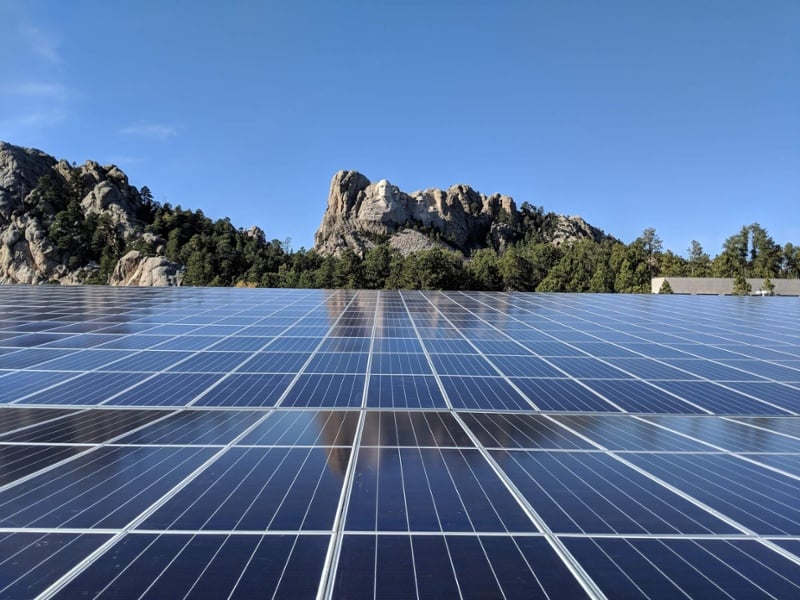NEW: We Made the List: America's Top 100 Most Loved Placed to Work
How Solar Creates Financial Resiliency for Businesses
October 28, 2020

Updated 12/06/2023
Businesses can experience many financial downturns and unanticipated costs. Decreasing residential rents, increased competition, and uncertainty in demand can lead to a lot of business variability. To protect your company against these risks, it is important to consider financial resiliency. Financial resiliency measures a business’ ability to withstand a crisis or an economic slowdown. In this blog, we’ll explain how a commercial solar panel installation is an excellent method of becoming more financially resilient.
Electricity Cost Uncertainty
The ability to lock in the electricity rate is advantageous because it offers long-term price certainty, especially as we face rapidly inflating energy prices. In the past decade, utility prices in the U.S have risen by a total of 27%, or approximately 0.2 cents per kilowatt hour (kWh) each year. While this may not seem like a lot, it adds up over time. For example, if your property uses about 2,000 kWh of electricity per month, your utility bill now is likely much higher than what it was 10 years ago.
Figure 1: Rising electricity rates in the U.S between 2012-2022
Utility rates are expected to continue rising over the foreseeable future. According to the Energy Information Administration (EIA), the electricity price is going to increase in the short-term and the long-term thanks to fluctuations in energy demand and fuel costs. New generation capacity is also needed to meet this growing demand, potentially causing energy prices to increase further for residential and commercial customers.
Solar Financing Options
The two most popular purchasing methods for solar panels are: buying the system upfront or entering a solar power purchase agreement.
Cash Purchase:
If your business decides to buy the system upfront, you can directly receive the federal solar Investment Tax Credit (ITC) and other solar energy incentives. Purchasing a system can simplify the process of installing solar by removing the need for financing or additional parties that may require credit checks, however, you may need to manage incentive applications or arrange long-term operations and maintenance.
Power Purchase Agreement (PPA):
A PPA is a framework whereby a commercial or residential customer agrees to buy electricity from an energy provider. In return, the provider installs solar panels on the customer’s property and sells the energy produced by the panels to the customer at a predetermined rate. This rate is fixed over the length of the contract (generally 20-25 years) and is typically lower than the rate the customer is currently paying to their utility. After the contract expires, the customer has the choice of either renewing, purchasing the solar equipment, or removing the system all together.
Solar as an Energy Cost Hedge
If your facility chooses to install solar through a PPA, your electricity rate will likely go down over the next 15 to 20 years. In many markets, solar energy is available at an immediate discount to grid power, plus the rate is locked in over the long term. This is all possible without having to invest in the system — a unique opportunity for property owners.
Alternatively, should you choose to purchase the system outright, the typical payback period is 5 to 12 years, depending on install complexity and the cost of grid electricity. The result is a significantly lower electricity bill for the remainder of their solar energy system’s life. The savings each month contribute to your return on investment (ROI) for the solar installation costs.
Figure 2: Electricity savings with and without PPA over a 20 year period
Reducing Risk with Solar
Solar offers tremendous benefits to businesses, helping them reduce risks and become financially resilient. By locking in energy prices with a solar PPA, you are protecting your facility from energy price volatility for over two decades. Additionally, thanks to lower monthly costs, you can allocate your capital to developing your business, such as generating new investments, enhancing customer services, or hiring new employees.
For many companies, the motivation to install solar goes beyond emissions reduction and energy independence and instead focuses on cost benefits. Commercial customers in the U.S can now leverage the unique PPA framework to adopt solar energy with no upfront cost. Alternatively, if commercial customers decide to install the system with cash up front, they can maximize their benefit from the ITC. Regardless of how you fund your solar solution, the result is a more predictable electricity rate, insulating your business from cost uncertainty.
That’s financial resiliency.
Ask an Expert
Deciding on a renewable energy strategy for your facility can be challenging. The Pivot Energy team is ready to support your business in choosing what approach is best to achieve your solar goals. Reach out today and speak with a member of our team.







